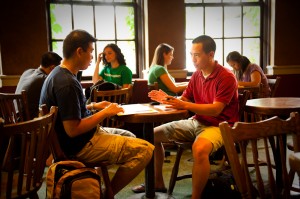Tom recently posted about graduate students mentoring undergrads at Johns Hopkins. Graduate school offers many opportunities to mentor, whether that means chatting with your undergraduate students during office hours or introducing new graduate students to your department. Here are a few things I’ve learned about mentoring during graduate school.
1. Treat the person you’re mentoring as a less-experienced peer.

One of the things that most impresses me about my own mentors is how well they do this. They show respect for my ideas and projects, but they also offer wisdom about areas where they have more experience.
One of the best things you can do for someone you’re mentoring is to communicate your respect for their work, and within that context explain things that person may not know yet. When I’m open to learning from the knowledge and experience of those I’m mentoring, I’m more able to pass on my knowledge in turn.
2. Remember the ways that life and work intertwine.
I’ve also been impressed because my mentors are skilled at recognizing the interaction between life experience and study. They recognized that the context of my life experience made a difference to how I would learn in a particular semester of graduate school. In advising someone you’re mentoring, it helps to keep in mind how their life experience enriches and complicates their work. For instance, if you’re advising a student who has just moved across the country to start your program, the advice needed might be different than it is for someone who grew up in the community where your program is located.

3. Invite others into community
One helpful thing mentors can do is to invite other people more deeply into community. Invite a gifted undergraduate to a department lecture and introduce him or her to a few professors who are teaching interesting courses next semester. With other graduate students, arrange coffee with a senior graduate student who might have similar interests or initiate workshopping groups. Don’t underestimate the value of just hanging out with other graduate students. One of the reasons I felt comfortable asking a more experienced grad student for advice in my first year was that he and I both went to Dr. Who viewings hosted by another student in the department.
4. When you’re learning about a task someone else will have to do, keep that person posted on your process in a relaxed way.
This thought is more relevant to mentoring interactions with fellow graduate students than with undergrads, but I’ve found it helpful. Graduate school has many tasks that everyone will have to face eventually – writing grant proposals, prepping conference talks, and of course ultimately producing a dissertation. While the advice of professors is really helpful, sometimes a note from a fellow graduate student a bit further along the curve can be even more useful in sorting out a difficult task.
I had signed up for my department’s grad student mentoring program, so when I was writing my dissertation I was also mentoring a talented graduate student several years earlier in the program. Whenever I noticed something important to my own growth in dissertation writing, or realized something I should have done differently about the process, I would send him an email describing it. I started out with a note introducing the idea and explaining that I didn’t expect him to read or respond to every email, and that he might have thought of many of these things already in the course of other projects. But I also articulated that it was sometimes nice to see someone else’s process, and that describing my process helped me to understand it as well. Those notes turned out to be helpful to both of us.

5. In addition to being a source of answers, be a source of questions. When I think about my own mentors, their questions stand out to me even more strongly than their answers. They’ve given me incredibly helpful advice over the years, but their ability to frame questions was even more formative. Helping someone else articulate his or her central questions is one of the best things you can do as a mentor. The questions that I remember shaping my life had several things in common. They rarely needed an answer right away, though they invited one if I was ready to give it. They were specific enough to elicit a concrete answer, but they were open-ended enough to be a springboard to my own ideas rather than just a vehicle for the questioner’s expectations.
A few examples of questions that might be used in this way:
- How do you see your faith and your field interacting?
- How have you grown as a teacher/researcher/student over the last semester?
- What books have been most helpful to you over the past year?
- What are you central questions in this project/in your field/in general? What are the advantages and disadvantages of this method of teaching/approach to research/etc.?
As I wrap up this series, I’m struck by the generosity of those who have mentored me. I’m also struck by how that generosity continues to shape my life over time. Many things I didn’t even realize I was learning from my mentors have grown to become very important elements of my life and study.
What are some of the things you have learned from your mentors? What are questions you’ve found helpful in mentoring and being mentored? What would you hope to pass on to those you are mentoring?

Also in this series: Finding Mentors as an Undergraduate, Finding Mentors Who Share Your Faith, The Art of Being Mentored, The Art of Learning Wisdom from Mentors, The Art of Maintaining Relationships With Mentors.
Dr. Hannah Eagleson loves building the ecosystem Christian scholars need to flourish and create positive impacts, in the university and beyond. She is Associate Director of InterVarsity’s Emerging Scholars Network, a digital first ministry serving thousands of early career Christian scholars. Dr. Eagleson launched the ESN student/early career track at the American Scientific Affiliation annual faith and science conference. She is the editor of *Science and Faith: Student Questions Explored* (Hendrickson, 2019), and the one-semester guidebook *Scholar’s Compass: Connecting Faith & Work for Academics* (InterVarsity Emerging Scholars Network, 2021), with design by noted liturgical artist Ned Bustard. She also launched the Scholar’s Compass online devotional series in her previous role as ESN Editor. Dr. Eagleson holds an MA from St. John’s College (Annapolis, MD) and a PhD in Renaissance literature from the University of Delaware.

Great series! Thanks.
This post and the series in general have me wondering how one might go about engaging a potential mentor when one of the traits they value is your ability to work independently and generally be “low maintenance.”
Hi Andy,
Great question! It does seem that many potential mentors in graduate school value independence and hope for “low maintenance” graduate students.
Sometimes with mentor figures who are very busy, I tell them up front that I know how busy they are, and then ask for something very small or specific. I might say, “I know you don’t have a lot of time, but I’d love to get your advice about which paleography course to take – could we schedule an hour sometime in the next month to talk about it?” Or if I’m hoping for something ongoing, I suggest a mentoring meeting every 3 or 6 months. I’ve found I can learn a lot from people I only see once a quarter or twice a year, and having to summarize what I’ve learned in between for the mentor helps me think about the shape of my work as well.
Picking really convenient times to meet has also helped – I would try to schedule meetings during the professor’s office hours or over a lunch break or something like that.
Hope some of that was helpful – any thoughts from anyone else? The question is really relevant for most academics.
Really good question, Andy. Hannah’s advice is excellent regarding scheduling and frequency. Another suggestion I’ve picked up from others is that most of us will have multiple mentors, who contribute different things to different parts of our life. Like Hannah suggests, you may have one mentor who desires “low maintenance” relationships, who you meet with less frequently and discuss specific, planned topics. There’s nothing wrong with that kind of relationship, but there might be a need for another mentor in your life who is happy to meet more often and be more involved in your life. I have a few people like that in my life. I know that a “quick lunch” with them will really be a 2-hour conversation, and we’ll break off knowing that we could have kept going for another 2 hours. Because of the time and intensity involved, those relationships have to be limited as well.
One other thought: some people are more motivated by work than relationships. It’s not always possible with all mentors, but a joint project (especially in an area of their interest) might be another way to spend time with a mentor. I have a close family member for whom this is true – my best times with him have generally been when we’re working on something together.